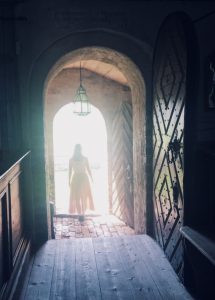
God is in the structure
My deepest desire now is to move from striving to flow, both in my creative work and in life. In order to do that, I need structure. Structure is the safe container in which tender ideas can grow and focused work flow.
This took me some time to realize. Flow happens when I’m focused and relaxed, and structure allows me to focus and relax. So I commit to my structure, fiercely. I create proper space for the work I do, inside and outside, I schedule time for it, and then I show up.
I don’t wait for inspiration, goodness no. I show up at the appointed time. Inspiration usually meets me there.
Do your most important work first (and that might not be the same as the work that brings in the most cash. Or any, at this point).
I used to feel a need to get a lot of things out of the way first, before I could write. To create the perfect conditions for work. Not anymore. I don’t answer all those emails or clean the house before I write. I keep my study in good shape, always, but outside of that door the house can be a complete mess. I close the door and get to work. First things first.
And for me, the first priority is to write. My early morning hours are my most productive, so I write first thing in the morning. This can mean waking up at six a clock, before anyone else is awake, go straight to my study, grab a notebook and a pen and start writing.
Ideally, I’d spend a couple of hours each morning on writing. As it is now, with small kids at home, I may just get half an hour, but it’s a good half hour. It sets the tone for the rest of the day. For the rest of my life, actually.
I cannot underscore the importance of this enough. You may not be able to spend your days doing what you love the most, you may have another job and other responsibilities, but if you’re clear about what your heart’s true work is, then that needs to show in your choices, somehow. You need to find a way to give it priority.
When you do, it will change your life. It will shift things around and, over time, allow you to grow into that dream, fulltime. If you want to.
Kind planning
I allow time for transitions. Things take more time than I think. Changing from one task to another takes time. Regaining my focus after being interrupted takes time. Planning for this makes for a kinder and more spacious workday. (I’m still learning about this one.)
It’s all energy
I always mind my energy. I don’t even send an email without closing my eyes for five seconds and making sure my energy is right (kind, open, in integrity).
One thing at a time
I don’t multitask. Because I suck at it, and because it kills deep concentration and with that any chance of flow and brilliance.
A solo entreprenuer inevitably has a million small things to handle during a day. The challenge is to manage all of it, one thing at a time, and still have enough headspace for the most important work.
One thing I’m considering is batching writing assignments together and getting one month’s worth of articles and blog posts done in a couple of days, for instance. It saves time and allows me to get properly into writing mode, instead of shifting in and out of different kinds of tasks. It also takes the stress off should my backpain flare up and keep me from working, because several pieces are already written and ready to post.
Another thing that I’m sure will help is hiring a virtual assistant to get some of the small, day to day administrative tasks off my desk. That way I’ll be able to focus more on writing and building my business.
I’m in the process of hiring one right now, and even though I look forward to the help, the thought of not doing (controlling) absolutely everything myself is also a bit scary.
Getting my writing done efficiently (and with some sense of ease)
When I write a blog post, I like to do it in two or three shorter sittings. I do a rough draft the first day, and I try to write it as swiftly as I can. On day two I delete some of it, add something else, and make sure it holds together. On day three I polish it up a bit. Ok, a lot. I’m a perfectionist in the finishing stages of the writing process.
Before I knew how creative processes work, I was a perfectionist in all stages of writing. This is not a good idea. First drafts (of anything, not just writing) are by necessity messy work and you must learn to allow that messiness. Flow will only happen if you don’t hold back. This is crucial – and so difficult. Don’t censor yourself in the early stages of creation.
That’s why I divide my writing into several sittings, to keep the different kinds of writing – and the different aspects of myself that I employ for it – apart. First, swift writing, straight from the heart (or the hip); second, re-writing and editing for brevity and clarity; third, polishing for beauty and flow.
Pen and paper
As often as I can, I write in a notebook or on paper first. It allows me time away from my computer, and it also helps me stay in a swift writing mode. Editing handwritten text is a lot more work, so I’m not tempted to do it.
Eliminate distractions
I limit my time on social media strictly.
No email notifications on.
I don’t answer the phone when I’m writing.
The power of small rituals
I drink tea, good quality green tea, and plenty of it. Because I like it, obviously, but it serves another function as well. When I sit down at my desk with that steaming cup it sends a signal to my subconscious. Time to work. Small habits and rituals like that helps you get into the right mode faster.
Keep it tidy
I keep a few inspiring trinkets, images, words and drawings around me, but no crap litters my desk. My workspace is sacred. No bank statements or invoices lying about. No long, stressful to do-lists. Just what’s relevant for today. This is crucial to me.
Some call their messy workspace a creative chaos but that, my dear, is a completely different thing. Creative chaos has to do with the PROCESS. That, as I mentioned above, must be messy at times. Your workspace doesn’t have to be. Shouldn’t be, if you ask me. I’m with Gustave Flaubert on this one:
“Be regular and orderly in your life, so that you may be violent and original in your work.”
Structure, healthy boundaries and nourishing rituals are the safe keepers of our wild, original creativity.
How this all fits in with me watching four episodes of Outlander instead of working on this post yesterday? Well, it brings me to my last point:
You need to let yourself off the hook every now and then. Especially if you’re a stern boss, like me. If you’re too tired, go take a nap. If you feel like you can’t squeeze a drop of creativity out of your dry, flustered brain, don’t try. Do something else. Take a break. It’s probably exactly what you need to get back on track.
Successful creative habits are all about getting back on track, day after day after week after year. It’s all about finding ways to make work feel like home (sweet home). That’s how we get things done, and stay happy in the process.









